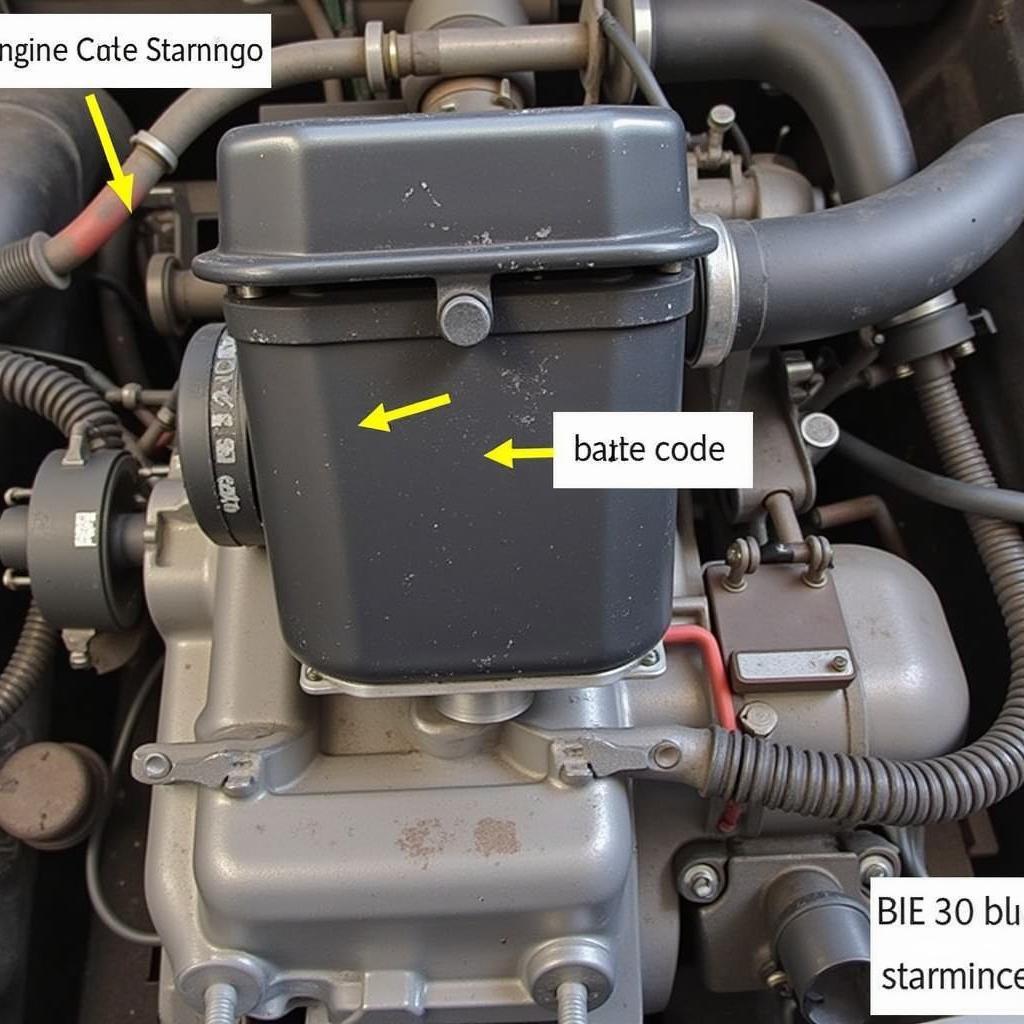Your cart is currently empty!

Understanding the VW Type 1 Engine Code AE
The VW Type 1 engine, also known as the air-cooled flat-four, has a long and storied history. One specific iteration of this engine carries the code AE, and understanding its characteristics, quirks, and maintenance needs is crucial for owners, mechanics, and enthusiasts alike. This article will delve deep into the vw type 1 engine code ae, providing you with valuable insights and practical advice.
A common question among VW Type 1 owners is locating specific engine components. Check out this helpful resource on VW 2.0 Engine Code Location for guidance.
Decoding the AE: Specifications and Significance
The AE engine code signifies a specific configuration of the VW Type 1 engine, primarily found in later model Volkswagen Beetles and Buses. It’s a 1.6L, fuel-injected engine, a departure from the earlier carbureted versions. This change brought about improved fuel efficiency and slightly increased power output, marking a step towards modernization for this classic engine. Knowing the specifics of your AE engine is essential for proper maintenance and repair.
 VW Type 1 Engine Code AE Identification
VW Type 1 Engine Code AE Identification
Common Issues with the VW Type 1 Engine Code AE
Like any engine, the AE has its share of common issues. One frequent problem is fuel injection system malfunctions. Due to the age of these vehicles, components can degrade, leading to erratic idling, poor performance, or even starting difficulties. Another area of concern is the cooling system. Although air-cooled, these engines still rely on oil circulation and external cooling fins for heat dissipation. Proper maintenance of the cooling system is vital to prevent overheating, which can lead to catastrophic engine damage.
For those interested in Volkswagen gearbox codes, explore the VW Golf MK4 Gearbox Codes resource.
Maintaining Your AE Engine: Tips and Tricks
Maintaining the vw type 1 engine code ae involves regular checks and timely replacements of key components. Regular oil changes are paramount, using the correct viscosity and type as specified by Volkswagen. Inspecting and cleaning the cooling fins is also crucial for optimal heat dissipation. Furthermore, paying attention to the fuel injection system, including the fuel pump, injectors, and related sensors, can prevent performance issues down the road. Addressing potential vacuum leaks is another preventative measure that can significantly impact engine performance and fuel efficiency.
Troubleshooting and Repairing the AE Engine
When troubleshooting your AE engine, a systematic approach is essential. Start by checking for any fault codes using a diagnostic tool. This can provide valuable clues about the nature of the problem. Next, inspect the fuel system, checking for leaks, clogged injectors, or a failing fuel pump. If the cooling system is suspected, examine the cooling fins for blockages and ensure the fan is functioning correctly. For more complex issues, consulting a specialist is recommended.
Understanding Volkswagen equipment codes can be helpful. You can find more information on VW Equipment Codes.
Why is knowing my VW Type 1 engine code important?
Knowing your engine code is essential for ordering the correct parts, understanding its specific characteristics, and performing accurate diagnostics. The AE code differentiates this engine from other Type 1 variants, ensuring compatibility and proper servicing.
What are some signs of a failing fuel pump on an AE engine?
Symptoms of a failing fuel pump can include sputtering, difficulty starting, loss of power, and decreased fuel efficiency.
“Understanding the specific nuances of the AE engine is critical for proper maintenance and repair,” says renowned VW mechanic, Hans Schmidt. “Regular maintenance and timely addressing of issues can significantly prolong the life of these classic engines.”
Need information on VW AWD engine components? Check out VW AWD Engine Code Cylinder Head Hose.
Conclusion
The vw type 1 engine code ae represents a significant evolution of the iconic air-cooled engine. By understanding its characteristics, common issues, and maintenance requirements, you can keep your VW Beetle or Bus running smoothly for years to come. Remember, proactive maintenance is always the best approach. For any questions or assistance, connect with us at VCDSTool. Our phone number is +1 (641) 206-8880 and our email address: vcdstool@gmail.com and our office is located at 6719 W 70th Ave, Arvada, CO 80003, USA.
If you’re working on a VW 1.8T engine, knowing the engine code location is important. Check out this resource: Engine Code Location VW 1.8T.
FAQ
-
Where is the engine code located on a VW Type 1 AE engine? The engine code is typically stamped on the engine block near the oil cooler.
-
What is the displacement of the AE engine? The AE engine is a 1.6L engine.
-
What type of fuel injection system does the AE engine use? The AE engine utilizes electronic fuel injection.
-
What are some common problems with the AE engine’s cooling system? Clogged cooling fins and a malfunctioning fan can lead to overheating issues.
-
What is the recommended oil for the AE engine? Consult your owner’s manual for the specific oil viscosity and type recommended by Volkswagen.
-
How can I diagnose a problem with the AE engine’s fuel injection system? Using a diagnostic tool to check for fault codes is a good starting point.
-
What are some signs of a vacuum leak on an AE engine? Rough idling, poor fuel economy, and hissing sounds are potential indicators of a vacuum leak.
by
Tags:
Leave a Reply